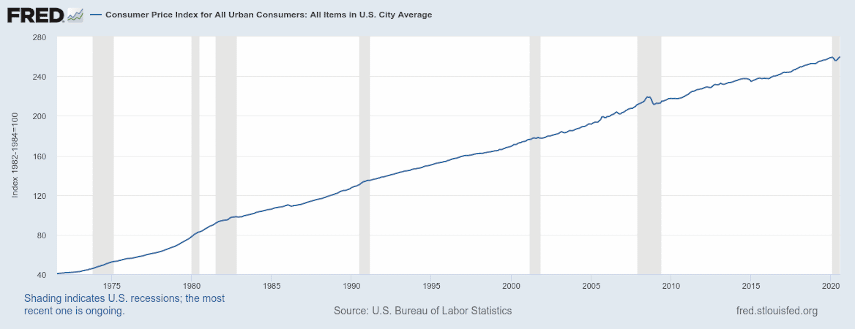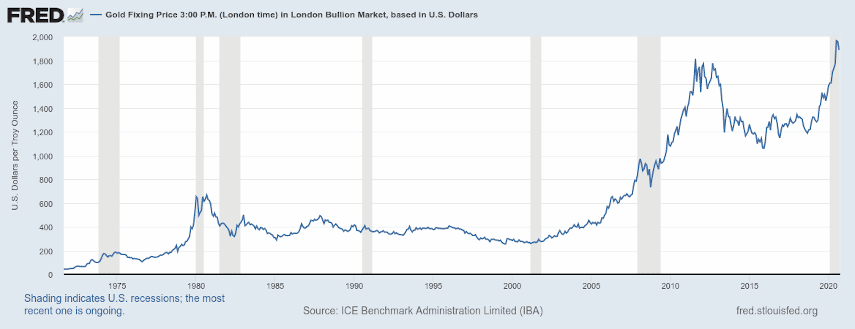War’s Effects on Gold, Oil, and Markets
If you had told someone at the beginning of 2022 that Russia would invade Ukraine, they wouldn’t have believed you The idea that in this day and age any country would just unilaterally attack...
Economy

Inflation is a hot topic these days. Despite the fact that official government price inflation figures have rarely exceeded an annualized 2% growth rate over the past decade, price increases felt by many American households have far outstripped those official rates.
That hasn’t deterred the Federal Reserve from trying to boost inflation, as the Fed has announced its intention to push inflation rates to an average 2% inflation rate over the long term. Since inflation rates have been under 2% for such a long time, the Fed now fully intends to overshoot its 2% target.
The questions that many investors have are, what effect will a rising inflation rate have on gold prices, and does inflation have an effect on gold prices? It seems obvious to most people that higher inflation should have an effect on the gold price and rising inflation should lead to a higher gold price, but do the numbers bear that out?
It’s important to distinguish between the original definition of inflation and the modern definition of inflation. Traditionally, inflation was defined as an increase in the money supply. The effect of inflation, all other things being equal, was higher prices.
Today, that original definition of inflation has been all but forgotten, and the effects of inflation are now conflated with inflation itself. So when most financial commentators discuss inflation, they’re talking about the general increase in prices across the economy.
Even though cause and effect have become confused, the general rise in prices that is now described as inflation still has its roots in money creation. And as more and more money has been created over the past decades, prices throughout the economy have continued to rise.
Many investors may not understand how inflation affects their investments, nor may they care. After all, if you’re seeing returns of 6-8% per year on average, do you really pay attention to 2% inflation? Or if stock markets have a really good year, gaining 30%, how difficult is it to make investors aware that their assets are being devalued by 2% every year?
An inflation rate of 2% may not seem like much, but it means that prices will just about quintuple over the lifetime of the average American. Over the long term, inflation rates have been higher than 2%. That’s particularly true over the last 50 years, coinciding with the time period after the closure of the gold window in 1971.
For decades, the US was on a gold-exchange standard of sorts. While Americans couldn’t own gold or convert their dollar into gold, foreign governments were able to redeem their dollar holdings for gold from the US Treasury. That was supposed to act as a check on unfettered money creation.
Unfortunately, the US government took advantage of the fact that the dollar was the world’s reserve currency and was trusted to be as good as gold to create more dollars than they had gold backing. The redemption of dollars for gold by foreign governments began to accelerate, and President Nixon closed the gold window on August 15, 1971.
Since that time, inflation rates have increased at an average annualized rate of about 4%. For some reference, a 4% average inflation rate means that prices will increase by a multiple of 23 over the lifetime of the average American. Something that costs $1 when they are born will cost $23 when they die. That demonstrates the danger of even “low” inflation rates.
The higher inflation rates get, the less valuable investors’ assets become. Certain investments no longer make economic sense once inflation is factored in. That’s particularly true for bank savings accounts, which never keep up with inflation over the long term. But in an era of abnormally low interest rates, even many types of bonds no longer make sense as investments because their rates of return no longer keep up with inflation.
Going forward, investors will have to really do their homework if they want to find assets that can help them keep pace with inflation.
When it comes to gold and inflation rates, many investors want to know whether inflation rates have an effect on gold prices. Conventional wisdom has long said that higher inflation rates often lead to higher gold prices, while lower inflation rates lead to flat gold prices. Is that really true? Is there a correlation between inflation rates and gold prices?
Let’s look at the data post-August 1971. That allows us a good view of a market-determined gold price, one which the US government was no longer trying to overtly control.
Here’s a look at the government’s official CPI (consumer price inflation) data, the standard measure of inflation within the economy:

And here’s a look at the London gold price, one of the benchmarks for world gold prices:

At first glance, it doesn’t look like there’s too much correlation. You can see the gold price spike in the early 1980s, the flat market that ensued thereafter, the bull market from the early 2000s to 2011, the fallback, and now the new highs. Compared to that, CPI growth seems slow and steady. Surely there couldn’t be any correlation?
Yet, in fact, over that time period the correlation between the inflation rate and the gold price is 81%. If you move forward and look at the correlation between the inflation rate and the gold price from 2000 to today, roughly the time period from the burst of the dotcom bubble to today, the correlation jumps to 90%.
That higher correlation is the result of copious amounts of new money and credit created by the Federal Reserve to combat first the dotcom bubble bursting, then the 2008 financial crisis, and finally the massive monetary stimulus unleashed to combat the coronavirus lockdowns.
What this should indicate to investors is that, over the long term, increased inflation should lead to correspondingly higher gold prices. With the Federal Reserve promising to keep the monetary spigots open and flowing at levels that boggle the imagination, that should be good news for gold investors.
It should also be pointed out that gold’s price performance is significantly better than inflation. The CPI index rose from 40.800 to 259.681 from September 1971 to August 2020, while gold rose from $41.10 to $1958.55. That means that gold grew 7.5 times as much as inflation, a reminder to investors that gold has long been a primary means of protecting against inflation. The last 50 years have obviously done nothing to change that view.
If you’re worried about the effect that higher inflation rates will have on your investments, if you’re looking to protect your assets against inflation, and if you’re hoping to secure your retirement savings against anything that may come your way, why look any further than an investment in gold?
Not only can an investment in gold help protect your assets against the damage done by inflation, it can also help grow the value of your assets over the long term. Looking once again at the last 20 and 50 years, gold has outperformed stock markets over each of those time periods.
With a gold IRA, you can roll over existing retirement assets from tax-advantaged accounts such as a 401(k), IRA, TSP, or similar account into a gold investment. That gold IRA gives you the same tax advantages as any conventional IRA, but allows you to invest in gold coins and bars, something that conventional IRAs don’t allow you to do.
If you’re looking to protect your retirement assets, isn’t it time to look into a gold IRA? Why wait until stock markets crash and gold begins to rise in price?
You’ve seen the numbers on gold vs. inflation and now it’s time for you to make a decision about your investments. WIth the Fed promising higher inflation in the future, don’t let your investments lose even more value to inflation. Contact the experts at Goldco today to learn more about how you can protect your retirement savings with a gold investment.



